Lori Stanley Roeleveld's Blog, page 15
July 20, 2020
A Psalm for a Pandemic
 O Lord, have mercy on us as we endure this year we did not foresee.
O Lord, have mercy on us as we endure this year we did not foresee.
At the first sign of trouble, we rose to the challenge, we united, we cried out to You with one voice and we placed our hope in a quick remedy.
Now, we confess we’re short-sighted, impatient, low on stamina, and that our unity has unraveled as quickly as it appeared. But You, O Lord, created us. You know our bent. You’re aware of our limits. You know our only hope of lasting unity is in Christ.
We are crushed beneath the weight of the losses that climb – loss of life, of careers, of financial stability, of safety, of normalcy, freedom, of congregate worship, of trust in one another, of the privilege of gathering with loved ones as they part this world. We are hard-pressed and at risk of losing heart. If not for Jesus, we would surely lose hope, and yet He lives and so we hold on, as we wait for You.
You.
How long, O Lord, how long must we endure – not only this virus – which we have more hope of curing than the other plague that has infected us – that of discord, discontent, disagreement, disregard, disputing, and disheartenment that is ravaging my people?
Our hearts cry out to You in the morning, weary You with sighs at noon, and groan into the darkness for deliverance from these times. Come quickly, Lord Jesus, come.
Yet we know you are not slow, but You love better than we do. You are patient, wanting for none to perish, but for all to come to repentance.
 So, we sense Your spirit prodding us to pray beyond the pandemic, to pray beyond the headlines, to come away with You into a desolate place and return to Your agenda, to Your direction, to Your breaking news.
So, we sense Your spirit prodding us to pray beyond the pandemic, to pray beyond the headlines, to come away with You into a desolate place and return to Your agenda, to Your direction, to Your breaking news.
The time of Your coming weighs on our souls as we consider all who continue to deny You, to suppress the truth with their unrighteousness, or who wander in darkness almost forgetting there is the hope of light.
And that is when we remember there is a greater call on our lives than the story of this moment. There is a greater story being told than any single headline of the day. There is a greater task at hand than requesting relief.
We who hold the truth of eternity within our very souls, the cure for the sinfulness of humanity, the hope for life in a culture of death, the blood of Christ that secures our freedom in this life and the next – we turn our eyes to You and in You we rise with  strength to run with horses and to outlast the hardship of these days.
strength to run with horses and to outlast the hardship of these days.
Renew our hearts within us. Lighten the burden of our souls. In these heavy times, show us Your easy yoke that we may endure.
Even as our culture enters the throes of death, yet within us, You are bringing life.
Even as the air grows heavy with deception, yet within us, the truth prevails and presses us to speak it out no matter the cost.
Even as darkness descends with a relentless hunger to consume unwitting souls, yet within us, the light of Christ bursts forth and shines and overcomes.
Now we remember, O Lord, that while our humanity is pressed down by the weight of these days, yet greater is He that is in us than He that is in the world.
And with that hope our spirits rise. And in that hope, we renew our commitment to represent You well, to speak truth, and to deliver love that testifies to our citizenship in the eternal kingdom on this outpost of glory.
well, to speak truth, and to deliver love that testifies to our citizenship in the eternal kingdom on this outpost of glory.
We praise You that as You walked with those who came before us through fire, flood, and fury, so You walk with us through pandemics, politics, and polemics.
You assigned us to these times and designed us for these times. We are equipped in Christ for every good work – even here, even now – this we reaffirm today and will reaffirm tomorrow.
Silence all voices in our hearts and minds that do not speak Your truth into our weariness, our doubts,  our fears.
our fears.
We are Yours, O Lord, and all that matters now is that You are the final Word on our lives and that word is that we persevere and prevail in You.
A #Psalm for a Pandemic https://t.co/jJi1Ck0mBO #amwriting #pandemic
— Lori Roeleveld (@lorisroeleveld) July 21, 2020
July 14, 2020
Beware of Crowdsourced Faith
 More than Great Teaching
More than Great Teaching
Jesus’ ministry cannot be summed up as one of great teaching.
He was a great teacher. His sermons and parables are as relevant today as they were in time of the Roman empire. We do well to study His teaching and to continuously re-read the gospels.
The power of Jesus’ ministry, however, exceeds great teaching. One of the additional facets of His ministry is that, like the Father He perfectly reflects, His Words aligned perfectly with His life.
The daily choices Jesus made and the ways He invested His precious moments on earth can inform our living in these demanding times if we pay attention.
The Crowds
The gospels reveal how Jesus related to several key groups: the religious and political rulers of the day, His close followers (the twelve and the men and women who traveled with Jesus), sinners, the sick and the demon-possessed, and the crowd.
I’ve been reading Mark and closely watching Jesus’ relationship with the crowd.
This is important to me because so much of our current culture – both secular and faith-informed – seems to place great faith in the value of assembling crowds.
We like numbers – majorities – great assemblies of people. Crowds sway rulers, sell books, build ministries, garner attention, affect policies, and often win the day.
The Pharisees had incredible crowd awareness and crowd influence. Repeatedly the gospel writers tell us they based decisions on their “fear of the people.” Jesus called them out on their love of “being seen” and the hypocrisy of tailoring a public persona that doesn’t align with the private truth of one’s life. And in the final week of Jesus’ life before His crucifixion, the Pharisees succeeded in stirring up the crowd against Jesus – despite that only days earlier, they’d ushered Jesus into the Jerusalem with a parade of palms.
The Temptation of Crowds
Crowds do have power. And it’s hypnotic, alluring, and tempting to court. Jesus was tempted in every way we are and so, I have no doubt, He, too, was tempted at some point to play to the crowd. Yet, He resisted.
Early in His ministry, a great crowd followed Jesus. So great, Jesus tells the disciples to get a boat ready for Him “lest they crush Him.” The crowds were so large and so demanding, sometimes the disciples couldn’t eat, Jesus’ family thought He’d lost His mind, and the Pharisees grew to fear Jesus enough to plot to kill Him because they feared the people and the people followed Jesus.
Crowds aren’t tame. Yes, on the flannel-graphs in church school, they seem like a peaceable bunch  gathered on hills in little family groups waiting patiently for bread and fish, but we know better, you and I.
gathered on hills in little family groups waiting patiently for bread and fish, but we know better, you and I.
These crowds around Jesus were an assortment of sincere seekers and curious bystanders. There was the press of many needing healing or freedom from demons and so the crowds were full of the sick and of evil spirits. They sought forgiveness so there were many sinners. There was talk that Jesus was the Messiah who would lead Israel and so, the crowd likely drew Zealots, just waiting for the command to attack Rome. The Pharisees lurked in the crowd, watching, baiting, whispering, plotting.
And Jesus, understanding humans because He created them, loved them, even knowing that at any moment, they would turn.
Crowds, you see, are wild, unpredictable things.
The Secret to Resisting Crowd Appeal
At the beginning of Mark, we see a quietly pivotal moment that helps us understood how Jesus resisted the temptation to crowdsource His ministry.
Jesus had spent the night healing the sick and casting out demons. “The whole city was gathered together at the door.” For a new ministry, this would be ideal, a dream come true, the genesis of a great work for God.
But Jesus slipped away, while it was still dark, to a desolate place to pray. When His  disciples found Him and beckoned Him because “Everyone is looking for you.” Jesus replied, “Let’s go on to the next towns, that I may preach there also, for that is why I came out.”
disciples found Him and beckoned Him because “Everyone is looking for you.” Jesus replied, “Let’s go on to the next towns, that I may preach there also, for that is why I came out.”
We can surmise from this that they moved on leaving some people unhealed, many people disappointed, and others confused about why Jesus wouldn’t dance to the pipe they played.
Jesus’ focus was on His Father. That’s it. Pay attention to the Father and do the Father’s will. The crowds may gather or disperse but the plans for Jesus’ days, His actions, His Words, His movements were in line with the Father’s will alone.
It’s fascinating that Jesus demonstrated that He could control the wind, rain, demons, and sickness. His ability to exercise control was infinite. But He didn’t try to control the crowd and neither did He let the crowd control Him. Meditating on this has changed my prayer life. So many of my prayers are appeals to God to control the crowd and yet, I see from Jesus this shouldn’t be my focus.
Living Worship
Worship, it can be said, is what occurs when we rightly respond to the truth about God. If our lives are to be our living worship, then our days, our moments, must be a response to the truth about God – NOT a response to the circumstances or the noise of the crowd.
 If we live in response to the crowd, it’s too easy to begin to worship the crowd. If life is a constant response to the crowd, there’s no real difference between that and worshiping the crowd.
If we live in response to the crowd, it’s too easy to begin to worship the crowd. If life is a constant response to the crowd, there’s no real difference between that and worshiping the crowd.
If, however, in responding rightly to God, we serve those around us and gather a crowd, there’s no harm as long as we practice what Jesus did and pull away to desolate places to hear our Father’s voice above the roar. Then, whether they stay or go, as crowds will do, we are able to stand, in faith.
What say you? How do you see the crowd impacting the church and your personal ministry in our times?
How is the crowd impacting your personal ministry? https://t.co/bAouRX0Sw5 Have you crowdsourced your faith? #crowdsourced #Jesus
— Lori Roeleveld (@lorisroeleveld) July 14, 2020
June 25, 2020
We’re Asking the Wrong Question About Racism
 Too many of us are getting hung up on the wrong question.
Too many of us are getting hung up on the wrong question.
It’s easy to understand why. Harder to ask the right questions. I may have it wrong but here goes.
The question of the day is, of course, am I racist?
All of us are challenged to reflect on this, to confess to it if we realize it’s true, and to repent, to change, to progress.
There are a couple of problems with this question.
First, it’s begs a yes or no answer. We tend to grade ourselves on a curve and so often, compared to Nazis or the KKK, we score better so we give ourselves a no. No, I’m not even tempted by the KKK therefore, I’m not a racist.
This is problematic logic.
Second, even if we’ve prayerfully wrestled with this question and risen from prayer with the  understanding that we aren’t essentially racist, someone will likely tell us we just aren’t woke enough or aware enough or authoritative enough on the topic to draw that conclusion.
understanding that we aren’t essentially racist, someone will likely tell us we just aren’t woke enough or aware enough or authoritative enough on the topic to draw that conclusion.
Or, we’re blind to our own condition. Or we didn’t truly understand the question. Or we didn’t appreciate the full definition of racism as determined by today’s standard.
Any of that may hold shades of truth, so the ambiguity leaves us likely to become victims of a vague false guilt and nagging doubt from the evil one but with no effective action steps to address the issue. We flail about trying to bat this phantom racism away like an annoying gnat, but it keeps buzzing about distracting us from what may be actual areas of needed growth. (This is a common tactic of our enemy. Phantom guilt distracts us from true conviction.)
It’s a frustrating exercise to be told that on this particular topic, we can’t possibly be trusted to come to an informed decision through prayerful discussion with God. This fruitless cycle leaves Christians who are sincerely trying not to be racist frustrated and in despair. While those who do harbor hatred of others based on skin color are probably not losing sleep. (I hesitate to call these people Christians, though they may use the term for themselves because to hate is antithetical to following Jesus.)
 Third, the notion that there are different “races” is problematic for most Bible believers who understand that there is one human race, designed thoughtfully and creatively by God with a variety of skin colors, cultures, and ethnicities. Am I racist? I believe there’s only one race and since God is for it, so am I.
Third, the notion that there are different “races” is problematic for most Bible believers who understand that there is one human race, designed thoughtfully and creatively by God with a variety of skin colors, cultures, and ethnicities. Am I racist? I believe there’s only one race and since God is for it, so am I.
Of course, I don’t consider myself racist. I’ve grown up believing people are created equal and that all humans deserve respect, dignity, and love. I accept the idea that I have blind spots and am open to correction, but I am open. Ergo, I respond, no, I’m not racist. Still, after hearing the cries of my brothers and sisters of color, I’m not comfortable just leaving it at that. And so I conclude that maybe I’ve started with the wrong question.
I go to God’s Word, as is my practice for all of life’s major quandaries, and I find myself thinking there are more productive questions to ask that actually lead me to places where I can change and take action. These questions inspire repentance, continued growth, and kingdom work:
Do I love the way Jesus loves? (John 5:13)
Do I love everyone Jesus considers my neighbor? Are there ways I could love them better or  communicate that love clearer? (Luke 10:25-37)
communicate that love clearer? (Luke 10:25-37)
How can I show love to those who are expressing anger, pain, and desperation at a system they’ve experienced as unfair? (1 Corinthians 12:26)
Am I engaging with people in my community who look different from me? Why not? (James 2)
Do the demographics of my church reflect the demographics of my community? Of the world? Why not? Is there room for improvement? (Mark 6:15)
Am I willing to be uncomfortable to help people who don’t feel included or accepted in God’s family feel more at home? (1 Peter 4:9)
Am I quick to listen, slow to speak, and slow to anger? (James 1)
 Do I care enough about Christians of color to forget about myself and listen to them talk about their experiences and their parents’ experiences without judgment or defensiveness? (1 John 3)
Do I care enough about Christians of color to forget about myself and listen to them talk about their experiences and their parents’ experiences without judgment or defensiveness? (1 John 3)
If I’m a Christian of color, am I willing to see my beyond the skin of my Caucasian brothers and sisters and see them the way I want to be seen, as individuals worthy of respect and acceptance? (1 John 3)
God loves justice. Are there actions I can take that would further the cause of justice in my community? Or have I given up on justice this side of glory? Have I stopped trying because it’s hard? Have I lost hope and if so, can I repent of my own hopelessness and return to the work in faith? (Micah 6:8)
Jonah was blind to his own racism when he ran in the opposite direction of God’s call on his life to speak truth to the Ninevites. Am I living in obedience to God’s full call on my life? Are there ways I’ve placed my own comfort first over delivering the good news of Jesus or of engaging in the ministry of reconciliation to people who are from different cultures or ethnicities? (Jonah)
Am I growing spiritually, in ever-increasing measure, in faith, virtue, knowledge, self-control,  steadfastness, godliness, brotherly affection, and love so that I am effective and fruitful in my faith? (2 Peter 1:1-10)
steadfastness, godliness, brotherly affection, and love so that I am effective and fruitful in my faith? (2 Peter 1:1-10)
Would others say my life is marked by truth and love, both spoken and lived? Is the legacy I leave likely to be one of reconciliation, sacrificial living, and bringing glory to Jesus’ name? (Romans 12)
Can we imagine, for a moment, that if we worked with some of these questions that we might make a dent in reducing racism, deepening Christian community, and spreading the gospel at the same time?
If the question your asking yourself in this time in our generation leads you to change nothing, then you’re asking the wrong question.
 And if you’re not asking any questions, then loved one, you’re not even paying attention.
And if you’re not asking any questions, then loved one, you’re not even paying attention.
You’re not racist? Good for you. But that’s a pretty low bar to clear for a son or daughter of the Most High God. Aim higher.
Jesus has set us free. We don’t live under threat of punishment. We live free from fear of condemnation.
Why NOT ask the hard questions and continue to grow up in Christ?
We're Asking the Wrong Questions about Racism https://t.co/IAhaH7YVWV #racism #Jesus #leadership
— Lori Roeleveld (@lorisroeleveld) June 25, 2020
June 16, 2020
Fear Not Fire nor Flood nor Contentious Conversation (Seven Keys to Productive Conversations during Conflict)
 Every generation of Christians has its own challenges. Some must send young men and women to war. Others must abolish evil practices like slavery. One of our challenges is that we must get contentious people talking with one another. Many a general would prefer to lead troops into battle because at least he enters with a sense of control.
Every generation of Christians has its own challenges. Some must send young men and women to war. Others must abolish evil practices like slavery. One of our challenges is that we must get contentious people talking with one another. Many a general would prefer to lead troops into battle because at least he enters with a sense of control.
We know it’s imperative to get people talking about hard topics, but we hesitate. For good reason! It’s not easy to manage a group conversation when there is conflict or there are passionate opinions and a multitude of challenging personalities in the mix.
Still, James 4:17 ESV warns us “So whoever knows the right thing to do and fails to do it, for him it is sin.” We stare at that verse and long for wise support about how to lead effective hard conversations with conflicting groups in our family, church, ministry team, or community. Take heart! God will provide but we need to show up to receive the provision.
There’s no guaranteed way to keep a conversation from exploding or to ensure it produces positive outcomes but there are strategies to increase the likelihood that Christ will be honored, and people will feel heard. Today, our greatest achievement may be simply keeping people at the table.
By investing work to shape the conversational space before we discuss the primary hurting points, we establish an environment where success has the best opportunity.
Create a simple mission statement for the conversation. After opening in prayer, poll the room and ask what people expect to
 discuss and achieve. Establish a time frame and do the math on how many people can realistically be permitted to speak and for how long. Large groups may be divided into subsets. Our hardest conversations cannot be had through one meeting but usually require a series of conversations. Set this expectation and then determine an achievable goal for each meeting one at a time. Summarize with a simple statement such as, “Tonight, we want to find out what is important to everyone regarding our worship music” or “Today, our goal is to give everyone who wants to speak, the opportunity to share their perspective on how racism impacts them personally.”
discuss and achieve. Establish a time frame and do the math on how many people can realistically be permitted to speak and for how long. Large groups may be divided into subsets. Our hardest conversations cannot be had through one meeting but usually require a series of conversations. Set this expectation and then determine an achievable goal for each meeting one at a time. Summarize with a simple statement such as, “Tonight, we want to find out what is important to everyone regarding our worship music” or “Today, our goal is to give everyone who wants to speak, the opportunity to share their perspective on how racism impacts them personally.”Determine ground rules and enforcement strategies. Lead a brief discussion about ground rules that will help guide safe, orderly conversation as well as how those ground rules will be enforced. For example, “One person at a time. Everyone contributes. Respect will be extended to all.” This is a good time to discuss time limits on speakers or topics that will be saved for another day. A simple enforcement strategy is to invite the group to raise their hands if a speaker is violating the ground rules and that person will have an opportunity to self-correct before the facilitator steps in. Don’t neglect creating an enforcement strategy and employing it. Ground rules are ineffective if they aren’t observed. There should be as few as necessary, they should arise from the group, and enforced by the group whenever possible.
Identify areas of strength and places of agreement. Next, identify shared strengths and areas of agreement that already exist. (If a disagreement is identified during this time, acknowledge it by recording it but remain with strengths and agreements until there is a solid list.) Keep this list before the group. Add to it as other agreements are identified. Sometimes, the only agreement is that everyone agrees there is a problem. Celebrate this small starting place and be undaunted by it (Zechariah 4:10). Identify ways the groups’ strengths might be used to help during disagreement. Express gratitude in prayer for this list. It can be useful if decorum starts to break down to revisit this list.
Identify the stakes. There might not be high stakes in a discussion about paint color for the nursery, but discussions of worship
 format, racism, or leadership style may result in diminished witness in the community, loss of members, or changes in staff. Stating the stakes up front helps people respect that the words spoken in the room carry weight beyond the room.
format, racism, or leadership style may result in diminished witness in the community, loss of members, or changes in staff. Stating the stakes up front helps people respect that the words spoken in the room carry weight beyond the room.Normalize conflict and differences of opinion. It can be helpful to remind people that conflict and differences among Christians are to be expected and not feared. Not all differences arise out of sin and those that do can be met with the expectation of forgiveness and grace. God loves variety and He loves when His people do the work of reconciliation. Commit as a group to move forward unafraid of disagreement. Renounce fear in your midst. Assign one or two individuals the power to pause the discussion and check in with the room when they notice a breakdown in productive discussion. (If there are “sides,” designate a person from each side with this task.)
Encourage transparency and participation. It’s frustrating to reach the end of a hard conversation and hear muttering that some didn’t really agree but also didn’t speak up. Anonymous polling with the results read aloud can be a good barometer of true agreement. It helps people see they’re not alone (or that they are!) Verbal polling can also be helpful. Warn people a poll is coming: “Just a heads up that after Tom speaks, I’m going to poll to see where everyone stands on this topic (or on continuing the conversation), beginning with Lashonda.”
Determine a shared summary of the discussion at the end. It’s worth saving 10-15 minutes at the end to summarize what was discussed and agree on both what occurred as well as next steps. Revisit the groups strengths and agreements before closing in prayer.
Key to effective hard conversations is appreciating that it may take more than one to achieve progress. People must feel safe to come back to the table.
the table.
These seven guidelines will facilitate that in most situations, but truly, people feel safe when their leaders demonstrate fearless, wise, vulnerable confidence that God will bless obedience even when it passes through conflict.
This is a starting place but there are more tips in my latest book, The Art of Hard Conversations: Biblical Tools for the Tough Talks that Matter.
Seven Keys to Getting People Talking Effectively in Church https://t.co/K96v3cgXH3 #leadershipdevelopment #hardconversations #Jesus
— Lori Roeleveld (@lorisroeleveld) June 16, 2020
June 8, 2020
Behind Closed Doors – Hard Conversations among Christians about Racism
 My friend called me out. I’m a writer. A Jesus-follower. I have a platform. Of course, I should use it to speak into this moment. Why else would God give me a voice in these times? I literally wrote the book on how to have hard conversations.
My friend called me out. I’m a writer. A Jesus-follower. I have a platform. Of course, I should use it to speak into this moment. Why else would God give me a voice in these times? I literally wrote the book on how to have hard conversations.
So this radical Jesus-lover sent this: “Lori, we need to you to write a blog/post sharing your wisdom on how to have the hard conversation about race. Hope to read it this week. THX.”
I looked God straight in the eye because conviction is swift and crystal clear. He responded by bringing Galatians 5:13-14 ESV to mind, “For you were called to freedom, brothers. Only do not use your freedom as an opportunity for the flesh, but through love serve one another. For the whole law is fulfilled in one word: ‘You shall love your neighbor as yourself.’”
And I understood from that that while my ethnicity in one way affords me the “option” to wrestle with the question of racism, my relationship with Jesus leaves no such default on the table because the default of every believer is love and truth. The loving truth is that racism has no place in the Body of Christ. When my neighbor suffers, I suffer.
And that’s exactly how it should work, these hard conversations about race. My friend was watching for me to do what is right to do and when it didn’t happen, he called me on it.
me to do what is right to do and when it didn’t happen, he called me on it.
Honestly, I’ve hesitated to write on this topic because I’m not having substantive hard conversations with black friends. At least, not in person. I’m listening to everything they say through protests, written words, films, art, music, and sermons. And it’s right for me to listen because what business does some middle-aged white woman have writing anything about conversations of race?
But, here’s the thing. I’m not just a middle-aged white woman.
That’s what the world sees. But, what I am at my core is a daughter of the Most High God. What I am, in my inner being, is in Christ. All my hope for the world, for change, for deliverance, for overcoming, for true freedom is summed up in Jesus. I don’t believe that change comes through politicians or protests or programs (though I don’t object to those and believe God uses them for His purposes.) I believe change comes by way of the cross – changed souls, changed hearts, changed ways – because I’ve seen it with my own eyes.
Growing up in the sixties and seventies, I believed racism would be eradicated in our times. I grew up in a mostly white rural area but in the church – let me say that again – in the church, I saw men and women of every color gather to worship as one people. The favorite folk song at our  church camp was “Rainbow Race” by Pete Seeger. As a youth, I honestly believed it was a done deal.
church camp was “Rainbow Race” by Pete Seeger. As a youth, I honestly believed it was a done deal.
I confess that as I’ve grown aware through my almost sixty years of life that racism has proved more stubborn and persistent than we imagined, I’ve adopted a learned helplessness/hopelessness that honestly isn’t representative of Christ at all. But that’s no reason to give up on the work. We must be refreshed and renewed by the Holy Spirit – when we’re beaten down, we must allow Him to revive us.
There are hard conversations to be had outside the church but let me begin with conversations we can have between Christians. I’m pretty practical so I believe we each should be begin at home – hard conversations with our inner circle.
Right now, people in my inner circle are asking “What should I be doing? How can I help?” The temptation is to join a march and call it a day. Or rush out to find a black friend and press him or her for ideas. It’s always tempting to look for the quick fix for discomfort – like comfort food for the soul, but let’s not allow one another to get off so easily. Instead, let’s take one another seriously and ask, “Are we willing to commit time in fasting and prayer asking
 God what we should do? Are we willing to listen to black sisters and brothers who are preaching on this now – to read their books and engage in discussion? What are we willing to set aside to make space for this work in our lives? Are we willing to fan this impulse to flame or do we just want to quiet a flare up of cultural guilt? Do we accept the urgency our black brothers and sisters feel?”
God what we should do? Are we willing to listen to black sisters and brothers who are preaching on this now – to read their books and engage in discussion? What are we willing to set aside to make space for this work in our lives? Are we willing to fan this impulse to flame or do we just want to quiet a flare up of cultural guilt? Do we accept the urgency our black brothers and sisters feel?”We need to get comfortable with hard conversations about sin, repentance, and change – with other white Christians. (Yes, this can also apply to Christians of every color – sin is not bound by skin color.) We need to be persistent about calling one another out for the everyday attitudes, remarks, and Facebook memes that express thoughts that represent shades of hate, bitterness, or resentment. We’re too savvy to be outright hateful but we must be zealous for the name of Christ that we present ourselves for cleansing from every hint of it. Many of us who are white hear comments in those quiet conversations with others and we think we’re standing firm by just not joining in. That’s not enough. Here’s a rule I’m adopting – if I hear something I would be uncomfortable hearing in the presence of a black friend, I’m going to speak up.
Speak up how? Like every other sin, we speak directly but with humility, gentleness,
 and the hope of redemption. “I hope I’m wrong, but that comment sounded hurtful and unkind regarding people of color. Did you intend it to come out that way?” Racism is sinful. Period. We MUST confront it in ourselves and in our communities.
and the hope of redemption. “I hope I’m wrong, but that comment sounded hurtful and unkind regarding people of color. Did you intend it to come out that way?” Racism is sinful. Period. We MUST confront it in ourselves and in our communities.And while we’re praying for courage for our black brothers and sisters, we need to ask for a healthy dose of our own. A white reader asked me this week about speaking out. Here’s our conversation:
Reader: “I have a question and I hope this is a safe place to ask it. This is how it goes for me:
SJW- White people should speak out
White person speaks out
SJW- White people should shut up and listen.
Lol. I don’t know what to do except concentrate on my own actions and my own heart. But that’s probably going to look like I’m being silent. Advice?”
I responded:
“I love that question and have been praying about it. Here’s where I’ve landed: We need to speak or be silent in accordance with the commands of Scripture and the leading of the Holy Spirit. Period. There will always be someone who calls us wrong no matter what we choose so we cannot choose our actions in response to other people’s demands but only in obedience to God. To speak in these times is to risk being misunderstood, criticized, rejected, mocked, dismissed, labeled, or opposed. But we must represent Jesus and God’s Word regardless of the fallout. If we are silent, it must also be in His name and at His calling, not out of fear of the  consequences of speaking or the fear of getting it wrong. If we speak and someone shows us rightly where our words betray an inner prejudice, we should receive that in humility, process it with God, and grow. We will make mistakes but that’s not a reason to not try.”
consequences of speaking or the fear of getting it wrong. If we speak and someone shows us rightly where our words betray an inner prejudice, we should receive that in humility, process it with God, and grow. We will make mistakes but that’s not a reason to not try.”
I do have more to say about having hard conversations about race, but this has been a long post so there will be another.
For me, this is the place we begin – having hard conversations on our knees – repenting and seeking God’s counsel and then having hard conversations with our inner circles about the words we speak behind closed doors and the actions we could take that will lead to lasting change in the name of Jesus.
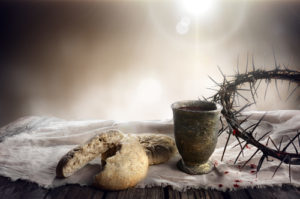 Frankly, there is no hope outside of Christ. None. In the history of the world, when the oppressed rise without Jesus, they simply become new oppressors. If we, as Christians, don’t involve ourselves in this work, there is no hope.
Frankly, there is no hope outside of Christ. None. In the history of the world, when the oppressed rise without Jesus, they simply become new oppressors. If we, as Christians, don’t involve ourselves in this work, there is no hope.
But, we know there is hope because we have all been to church and we’ve seen it happen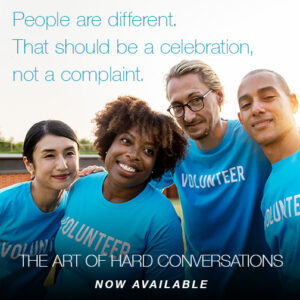 before our very eyes – brothers and sisters of every color worshiping as one.
before our very eyes – brothers and sisters of every color worshiping as one.
There is more work to do, but we must live and speak as people who know this hope. And because God has taught us how to have hard conversations, we can serve our brothers and sisters of color by engaging in this work, in the name of Jesus. Not without consequence on this side of glory, but with the hope of Christ in our hearts, we are already more than overcomers.
Are you having hard conversations about racism in your inner circle? Here’s some ideas how to begin. https://t.co/lTWTBzSJGr #Jesus #hardconversationsaboutrace
— Lori Roeleveld (@lorisroeleveld) June 8, 2020
June 1, 2020
Abuse of Power
 Whatever the headlines are on our preferred news stations, I believe there is a single headline about 2020 in heaven and it reads, “Abuse of Power.”
Whatever the headlines are on our preferred news stations, I believe there is a single headline about 2020 in heaven and it reads, “Abuse of Power.”
I’m not going to be cute with this blog. I’ll cut to the chase. I write for Christians because I love Jesus and I adore His people. There’s nothing special about me that isn’t also special about you. We wrestle with the same things, you and I, and right now, we’re wrestling with a year rampant with power struggles.
With every new catastrophe – fire, flood, locusts, pestilence, violence, plague, pandemic – there comes a struggle over power. Who will control the narrative? Who has accurate information? Who makes the decisions? Which decisions are right to follow, and which are right to defy? Who has the power to lead, to change, to dispense justice, to speak, and to judge?
And even when everything explodes on Pentecost weekend, God’s people still don’t connect the dots. I  know this because too many Christians respond to our times like so many chicken littles running around crying out that the sky is falling and too few of us stop to remember that we already know who has the power – it’s us.
know this because too many Christians respond to our times like so many chicken littles running around crying out that the sky is falling and too few of us stop to remember that we already know who has the power – it’s us.
We must remind ourselves of this because there are people depending on us to remember. There are over 118 references to power in the New Testament. It is a wonderful refresher to read each reference in context.
When Jesus began His earthly ministry, the people marveled because He taught with authority and power. He gave power to His disciples so they, too, could engage in His work. After His death and resurrection, Jesus told His followers to wait in Jerusalem until they were clothed with power from on high. At Pentecost, they were, indeed, filled with the power of the Holy Spirit and when they went forward, they spoke and acted from within that power.
Paul reminds Timothy “for God gave us a spirit not of fear but of power and love and self-control.” 2 Timothy 1:7 ESV
The evil one, who is God’s enemy, is the great deceiver and one of the greatest deceptions of this age is that we, the church, are powerless. Too often we fall for this lie and when we do, we let the weapons, which are not the weapons of this world, drop from our grasp, and we stand aside wringing our  hands when instead, we should act, speak, and pray from a firm foundation of power in Jesus Christ.
hands when instead, we should act, speak, and pray from a firm foundation of power in Jesus Christ.
No wonder Paul’s prayer for the Ephesians went like this: “I do not cease to give thanks for you, remembering you in my prayers, that the God of our Lord Jesus Christ, the Father of glory, may give you the Spirit of wisdom and of revelation in the knowledge of him, having the eyes of your hearts enlightened, that you may know what is the hope to which he has called you, what are the riches of his glorious inheritance in the saints, and what is the immeasurable greatness of his power toward us who believe, according to the working of his great might that he worked in Christ when he raised him from the dead and seated him at his right hand in the heavenly places, far above all rule and authority and power and dominion, and above every name that is named, not only in this age but also in the one to come. And he put all things under his feet and gave him as head over all things to the church, which is his body, the fullness of him who fills all in all.” Ephesians 1:16-23 ESV
The greatest abuse of power in our times is not political or racial or patriarchal or economic. The greatest abuse of power is God’s people forgetting who we are and who He is and living as helpless bystanders when really we are empowered as warriors to pray, to preach, to act as representatives of the most High God and to stand against the ruling authorities of this world – no matter how frightening they try to appear. With them, it’s smoke and mirrors, but our strength is more real even than our fear and forgetfulness.
Neither the government nor the media showed us how to love the world, Jesus did. Now,  let’s show them.
let’s show them.
I know we don’t appear powerful. I know there are longstanding issues in our midst that the church has failed miserably to address. I know that each of us harbors a secret list of our own weaknesses. None of this negates God’s Word. None of this changes the work of Christ on the cross. None of this makes us any different than the early church and they changed the world.
Let’s not wait for the world to invite us to speak or provide us with action steps or suddenly start believing in prayer. Let us live in the power of Jesus Christ who demonstrated power over temptation, over disease, over demons, over ruling authorities, over religious frauds,  over death – and let’s take that to the streets, in His name.
over death – and let’s take that to the streets, in His name.
Let us live so that the headline in heaven for the rest of 2020 reads, “And Then They Remembered the Immeasurable Greatness of His Power.” Amen?
What is the single greatest Abuse of Power in 2020? https://t.co/yEi7VkuCrb The answer may surprise you #Jesus #AbuseOfPower #ICantBreathe
— Lori Roeleveld (@lorisroeleveld) June 1, 2020
May 27, 2020
O, Me, Of Little Faith
 Lately I’ve been noticing the invisible people in Bible stories. Recently, it was a whole crowd who had previously managed to elude my view.
Lately I’ve been noticing the invisible people in Bible stories. Recently, it was a whole crowd who had previously managed to elude my view.
Who were these people? These ones who came out to the wilderness to hear John the Baptist, to repent of their sins, and to be baptized? In all my years reading God’s Word, my focus has always been on John but now, I wondered about all of these.
They’re mentioned in all four gospels, this nameless, faceless throng so affected by the words of this wild prophet, this precursor to Christ, this way preparer, this path straightener, this son of Elizabeth and her husband.
Matthew describes them this way, “Then Jerusalem and all Judea and all the region about the Jordan were going out to him, and they were baptized by him in the river Jordan, confessing their sins.” (Matthew 3:5 ESV)
Mark makes it sound like quite a crowd when he says, “And all the country of Judea and all Jerusalem were going out to him and were being baptized by him in the river Jordan, confessing their sins.” Mark 1:5 ESV)
Luke describes John’s back and forth with the crowd and says they were “in expectation, and all were questioning in their hearts concerning John, whether he might be the Christ,” (Luke 3:18 ESV).
questioning in their hearts concerning John, whether he might be the Christ,” (Luke 3:18 ESV).
John describes a similar back and forth between John the Baptist and a contingent sent from the Pharisees with questions about who the prophet was. (John 1)
Who were these crowds so aware of their need for a Messiah, so ready to hear a message about their sin, so eager to confess, so public with their repentance?
Too often I consider my modern faith superior to the crowds surrounding Jesus and yet, here were throngs of people who understood their lives were wrong and needed transformation. Here were people following a prophet who didn’t tell them what they wanted to hear but what God told him to speak. A prophet who bluntly pointed out their sin and instructed them to change, to die to themselves, to make themselves ready for Jesus.
He wasn’t selling them on the coming Messiah. He wasn’t creating a safe place for them to hear the Lord.  He wasn’t validating their strengths or affirming their seeking hearts. When they came to him, he told them their lives were all wrong and needed to be different – and they responded.
He wasn’t validating their strengths or affirming their seeking hearts. When they came to him, he told them their lives were all wrong and needed to be different – and they responded.
It brings to mind visions of Billy Graham Crusades – people responding to altar calls – flooding down auditorium stairs to kneel and pray at the foot of the podium. Throngs in the South dressed in white on sunny Sundays filing down to the river to be baptized in Jesus’ name. Revivals in South Korea, the Philippines, Nigeria, hidden China.
These visions create conflict in our spirits, do they not? We who have been conditioned to be suspect of the crowd, of trends, of the mind of the masses. We who have known that those who travel in crowds are subject to hive mind, to lemmings’ risks, to be led to slaughter like sheep.
And yet, is that distortion an enemy scheme to blind us to the waiting crowd?
Because, here they are, this invisible mob flocking to John to confess and repent. This straightforward, no punches pulled preaching resulted in – well – results. A people prepared to receive Jesus. Our forefathers and foremothers – the crowd who leapt together off the cliff into fuller life.
Of course, there were those standing with them who had come with ulterior motives, out of curiosity, to scope out the phenomenon, to exploit the moment. The gospels record them, too, and John’s plain message that they have no business entering the waters unless they are ready to confess and repent. Do we allow these modern Pharisees to silence us, to turn our eyes from the crowd waiting for Jesus?
scope out the phenomenon, to exploit the moment. The gospels record them, too, and John’s plain message that they have no business entering the waters unless they are ready to confess and repent. Do we allow these modern Pharisees to silence us, to turn our eyes from the crowd waiting for Jesus?
O, me, of little faith. When I look at a crowd – my community, my country, my generation – I work from a modern playbook and devise ineffective ways to appeal to them on Jesus’ behalf – so I can say I tried without risking my head.
I ignore the gospel truth that my work is to prepare the way. People don’t seek a cure for something they don’t know afflicts them.
The truth is that the crowd is still there suffering with a vague notion that something isn’t right. To address it they buy things or make things or part ways with things that no longer bring them joy in hopes they will find a worthy god in consumerism, industrialism, minimalism. They seek their god in other humans, or they give up god and escape until death arrives.
 And we know the truth as surely as John that the path they seek lies through confession and repentance in preparation for Jesus, but we value our heads more than love so we devise cloaked messages hoping someone will stumble into the truth.
And we know the truth as surely as John that the path they seek lies through confession and repentance in preparation for Jesus, but we value our heads more than love so we devise cloaked messages hoping someone will stumble into the truth.
Maybe, though, we can speak our generation’s language and still state prophetic truth. Maybe we could sit with our neighbors around a fire or at the island in our open concept kitchens and share our dilemma.
“So, you know I follow Jesus. I’ve been struggling lately to figure out how to talk with people about faith without sounding like a jerk. The prophets of the Bible plainly told people to confess their sins and repent. That message resonated with me once. It also resonated with crowds of people through time – people who felt their lives weren’t right no matter what they tried. People who felt deep down they were meant for more than the life they were experiencing. People weighed down with secrets sins and the fear they would be found out. What comes to mind for you when I mention confession and repentance? Have you found everything you’ve been looking for in life?”
I don’t know. I’m no John the Baptist. My faith is small, but maybe I can muster enough courage to ask a question.
question.
Because the reality is, there is, among my generation, another crowd (maybe the last crowd) waiting for someone to speak the truth. And whether I see them or not, God tells me they’re there.
O, Me, Of Little Faith https://t.co/dSelmNLvlt Speaking to the waiting crowd of our generation #Gospel #Jesus #truth
— Lori Roeleveld (@lorisroeleveld) May 27, 2020
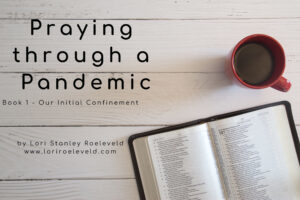 I’ve posted daily prayers on Facebook since the start of the pandemic and have collected those posted during our initial confinement in this free download for all of you who’ve asked. Feel free to download a copy today and share as God leads. Praying through a Pandemic
I’ve posted daily prayers on Facebook since the start of the pandemic and have collected those posted during our initial confinement in this free download for all of you who’ve asked. Feel free to download a copy today and share as God leads. Praying through a Pandemic
May 16, 2020
Praying through a Pandemic – Book 1 – Our Initial Confinement
 These past weeks have been an unprecedented time in most of our lives. The upheaval, confusion, isolation, conflict, grief and fear were widespread, but so, too, was creativity, renewal, and re-connection as we reinvented our lives.
These past weeks have been an unprecedented time in most of our lives. The upheaval, confusion, isolation, conflict, grief and fear were widespread, but so, too, was creativity, renewal, and re-connection as we reinvented our lives.
While some of us have found insight and relief from pausing life as usual, others have been pressed into harrowing, unrelenting service, and still others have lost loved ones, ministries, businesses, or dreams.
I attempted to cope with the COVID19 pandemic as I have with most of my life – through turning to God’s Word, through prayer, and through writing. On March 18th, I began typing a daily prayer onto my Facebook status and readers responded, asking for more. And so, I continued to type a daily prayer (as I still do.)
On May 9th, our tiny state, Rhode Island, began Phase 1 of returning to life beyond COVID19. I decided then to compile all the prayers from our initial confinement into a pdf booklet that I could share with you. You can download a copy of Praying through a Pandemic – Book 1 – Our Initial Confinement by clicking HERE or the link at the end of this post.
I offer these prayers for your use as God leads. Please feel free to pray these prayers in your prayer time or just read them as an historical, spiritual record.
You are welcome to print the booklet and share it with others.
I invite you to share individual prayers as you feel led as long as you reference the booklet.
I would love it if you find value in these prayers and in my posts, if you would share my website with others and invite them to subscribe. When they do, they’ll receive the same free download.
May God bless you with His presence during this trial we endure together, yet apart, and with a fresh revelation through His Word of the work of Jesus Christ on the cross and of His vision for your life.
I often refer to you readers as loved ones because you are – wholly, lavishly loved by our infinitely wise God. Take heart in the words of our Lord Jesus who said, “I have said these things to you, that in me you may have peace. In the world you will have tribulation. But take heart; I have overcome the world.” John 16:33 ESV.
Pray without ceasing during this time of re-invention. God is faithful and will be with us through whatever may come. “For you have need of endurance, so that when you have done the will of God you may receive what is promised. For, ‘Yet a little while, and the coming one will come and will not delay; but my righteous one shall live by faith, and if he shrinks back, my soul has no pleasure in him.’ But we are not of those who shrink back and are destroyed, but of those who have faith and preserve their souls.” Hebrews 10:35-39 ESV
Praying through a Pandemic – Book 1 – Our initial confinement by Lori Stanley Roeleveld
Praying through a Pandemic – Book 1 – Our Initial Confinement https://t.co/2xnSnwd2ok #freedownload #Jesus #Covid_19
— Lori Roeleveld (@lorisroeleveld) May 16, 2020
May 8, 2020
Judging, Not.
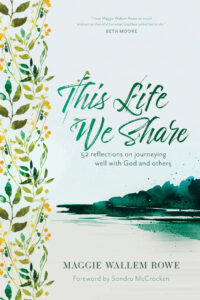
Did you ever meet someone and know immediately that you were kindred spirits? That he or she would become part of your fellowship of the ring? That’s how I felt the first time I encountered Maggie Wallem Rowe. It’s my pleasure to introduce you to her and to her knew devotional – This Life We Share. You can thank me later! 
May 6, 2020
The Invisible Parable
 The small band of Jesus followers sat weary and discouraged. The old woman came upon them and asked the source of their long faces.
The small band of Jesus followers sat weary and discouraged. The old woman came upon them and asked the source of their long faces.
“Our task is large, our numbers are small, and our faith feels small, though once it was great.”
The old woman looked on them with love and asked, “And what does it tell you in the Book about accomplishing this great task?”
Their Book was well-worn for they knew it well and loved the Author. Their response came quickly and was true. “It says our Lord has given us everything we need and yet . . . here we are.”
“Yes,” the old woman nodded, “I have known this kind of weariness.” She glanced around the room. “I notice in every corner and especially along the back wall, you have many unopened gifts. Tell me about these.”
“Those?” they replied, with looks that indicated they’d stopped seeing those gifts long ago, “There are many reasons we’ve left them where they are. It’s complicated, you see.”
“Make it simple for me,” the old woman said as she walked to one pile and pointed. “What about these?”
“Just look at the ancient wrapping on those gifts! They have been unused for so long! Surely  there can’t be anything there of use in modern times or that might appeal to this generation! We would never toss them out, of course. We cherish them. But surely there’s nothing there to help us in our great task!” They looked at one another with confidence in their response.
there can’t be anything there of use in modern times or that might appeal to this generation! We would never toss them out, of course. We cherish them. But surely there’s nothing there to help us in our great task!” They looked at one another with confidence in their response.
“I see. Well, what about this other pile. This wrapping isn’t ancient. Why are these untouched?”
They continued to respond with confidence in their thinking. “Oh, those gifts are waiting for their mates to arrive. Granted, some have been waiting a very long time, but we aren’t sure how to use them without them being in pairs. As soon as mates arrive, we’ll explore their gifts and put them immediately to use!”
“And these beside them? They appear to be rewrapped.”
“Yes, those are gifts that had mates at one time but lost them. So, they’ve been set aside until a new mate can be found or the old mate returns.”
The old woman closed her eyes for a moment before asking about the last two piles. “What of these and these?”
 “See that big pile is full of gifts that are of such odd shapes and sizes, we can’t imagine how to employ them in the task. They don’t fit any ways we currently work. Some are too big for us to manage, others too small, and others just escape our understanding all together. And that last pile? Well, those seem perfectly fine. They’ve just been sitting there so quietly, apparently, we’ve forgotten they were there. Maybe they don’t want to be put to use. The gifts that arrive well-shaped, in the proper groupings, that announce themselves clearly are all employed in the task.”
“See that big pile is full of gifts that are of such odd shapes and sizes, we can’t imagine how to employ them in the task. They don’t fit any ways we currently work. Some are too big for us to manage, others too small, and others just escape our understanding all together. And that last pile? Well, those seem perfectly fine. They’ve just been sitting there so quietly, apparently, we’ve forgotten they were there. Maybe they don’t want to be put to use. The gifts that arrive well-shaped, in the proper groupings, that announce themselves clearly are all employed in the task.”
The old woman closed her eyes, inhaled deeply, exhaled slowly, and waited in the silence that followed.
One of the Jesus followers rose and picked up one of the gifts leaning against the back wall. “Is it possible that we do have everything we need but we haven’t been seeing it? But why would some of what we need be invisible?”
The old woman smiled and opened the Book. “‘So we fix our eyes not on what is seen, but on what is unseen, since what is seen is temporary, but what is unseen is eternal.’ 2 Corinthians 4:18 ESV Is not our God an invisible God? Have we not been created from that which was invisible? Can you imagine, then, that He would employ both the seen and the unseen in this great task?”
And as she spoke, their eyes opened to the great number of gifts in their midst. And their hearts 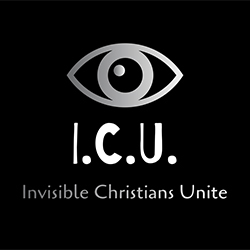 awakened to the great possibilities that before had been unseen. And the wrapping fell away from most gifts which revealed their obvious value, though a few others remained partially hidden.
awakened to the great possibilities that before had been unseen. And the wrapping fell away from most gifts which revealed their obvious value, though a few others remained partially hidden.
“What of those?” they asked the old woman, “Why do some remain almost invisible?”
“Ahh,” she laughed before she replied, “Certainly an invisible God has determined that some work would be done by those who remain invisible. Has He not, even now, expanded your faith to believe in the work they contribute even though it remains unseen?” (1 Corinthians 12:12-31)
“Yes!” they shouted as they joined her laughter. In fact, the room filled with the laughter of those who once had been weary and those who once had been invisible. And then, there was a great silence as they  prayed together and then a burst of chatter as they discussed the great task.
prayed together and then a burst of chatter as they discussed the great task.
And the old woman smiled as she watched the impossible – faith that cannot be seen expand and deepen before her very eyes.
What if your church is not as small as you think? https://t.co/tl9P0RkbsG #churchlife #leadershipdevelopment #Invisible
— Lori Roeleveld (@lorisroeleveld) May 6, 2020



